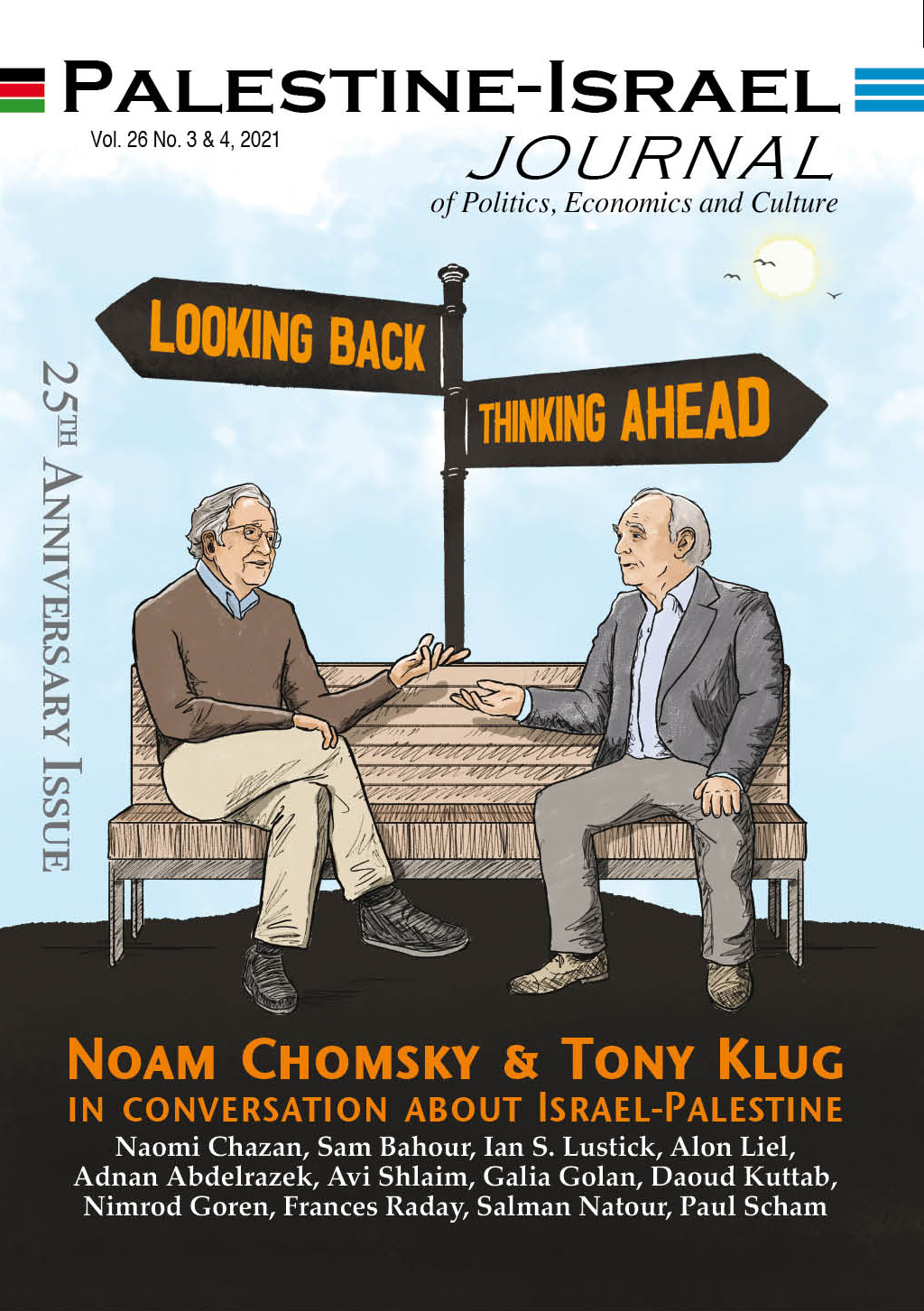As someone who lived through the period in question and was not far from the scene of the action for nearly four decades, I find the exchange of letters between Noam Chomsky and Tony Klug fascinating, albeit frustrating. At many points during this period, especially in the 1980s and 1990s, I was more than once near the room where decisions were made or even inside it. Unfortunately, an historical debate that microscopically parses what really happened and, in particular, who is to blame (which is so important in order to learn from the past) is hardly relevant to the decision-making process nowadays.
In the 1970s and 1980s, the two sides conducted their diplomatic-political confrontation in the international arena more or less on an equal footing. In the past two decades, especially in the last one, the Israeli- Palestinian balance of power has skewed dramatically, to the point that the current reality is totally different from that of the previous century. In the 21st century, Israel has grown stronger by every possible parameter (security, economic, technological, and even diplomatic), while the Palestinians have lagged far behind and have lost even the sweeping support they had enjoyed from the Arab-Muslim world. Some of these countries were simply consumed by the destructive struggles of the "Arab Spring" (Syria, Lebanon, Libya, etc.), others became so thrilled with Israel's technological achievements that they normalized relations to an unprecedented extent (United Arab Emirates, Bahrain, and even Morocco), and a third group whose public remained hostile, became dependent on Israel for their security and prosperity, and I am referring to Egypt and Jordan in particular.
The Current Imbalance of Power
The Chomsky-Klug correspondence mentions some behind-the-scenes contacts, but it has actually been a long time since any diplomatic talks have taken place, partly due to the imbalance between the sides. Given that there are no proposals on the table waiting to be rejected, it is hard to put the blame on either.
The current balance of power has resulted in Israel calling the shots in recent years. Israel savors its strength and superiority, while the Palestinians appear to have grudgingly come to terms with who reigns supreme. Moreover, for quite some time but especially in the last five years, Israel has come under no pressure to go back to the negotiating table. On the contrary, it has been rewarded lavishly (as with the relocation of the U.S. Embassy to Jerusalem) without being asked for anything in return, whereas the Palestinians have been mercilessly thrashed by the same U.S. Administration. If anyone (myself included) had thought that a prolonged absence from the negotiating table, the continued occupation, and uninterrupted settlement activity would intensify global pressure on Israel, they were grossly mistaken. Very few governments around the world are prepared to directly confront Israel on the Palestinian issue, even in the face of the ongoing escalating occupation.
Assuming the world sees no earthshaking political changes in the near future, the result of all of the above is that Israel not only calls the shots at present but will probably continue to do so in the future. It is up to the Israeli people, and no other public or political entity, to make up their mind about the available options so clearly described by Klug. Furthermore, the extreme disproportion between the sides suits Israel, whereas values such as justice, equality, ethics, and listening to the narrative of both sides are not part of the game at the moment.
.jpg)
Insights from the Chomsky-Klug Conversation
Having said that, I occasionally agreed with Chomsky and Klug and came away with some insights that leave an opening, albeit a narrow one, about possible negotiations in the future:
1. "The game is not over": A feeling that the final word has not yet been said on the Israeli-Palestinian conflict and that we won't be able to stay where we are now for long.
2. The year 2000 was a turning point: Arafat and Barak's failure at Camp David and the about-face that sparked the bloody second intifada changed the rules of the game and marked the divide between the 20th and 21st centuries vis-a-vis the conflict. The fact that it is currently at a relatively low intensity level could make things easier in the future.
3. The United States is still a key player: Even if the Biden administration has so far disappointed, internal developments may yet turn the United States into a more active and positive player. One of the ideas mentioned in the Chomsky-Klug dialogue - creating an American solidarity movement with the Palestinian people's struggle - looks interesting and even feasible under certain circumstances.
4. The damage inflicted by the BDS organization on the Palestinians and on a possible resumption of the peace process: Israel weaponized BDS through a sophisticated diplomatic effort. This issue calls for a bold Palestinian leadership to start rejecting extreme elements of the BDS ideology and redirect its energies to a more effective channel.
One of the more frustrating aspects of the correspondence between Chomsky and Klug is their dwelling on UN debates and resolutions pertaining to the Israeli-Palestinian conflict, as well as their argument about which side accepted, rejected, or violated UN resolutions. All UN resolutions up to December 2016 were passed under different conditions from the present ones, and definitely not under the current balance of power between the sides to the conflict. Only Security Council Resolution 2334 of late 2016, passed unanimously with the abstention of the United States, correctly reflects the current reality, especially in the West Bank. Should international conditions ripen for its implementation, it could end the impasse and push the process forward. If I could get to the White House, I would hang the text of Resolution 2334 on the wall of the Oval Office in the hope that the U.S. President adopts it as his policy and that it gradually becomes the handbook of those seeking a solution to the conflict.

